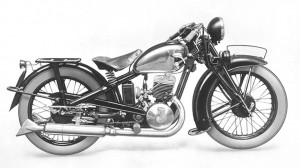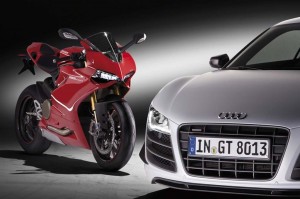Audi has confirmed the widely rumored deal that will see it spend an estimated $1.1 billion to acquire Italian sport motorcycle manufacturer Ducati.
The move by the Volkswagen AG luxury brand better positions Audi as a direct rival to BMW AG – as well as Japanese auto and motorcycle manufacturer Honda Motor Co. The acquisition still has to be approved by regulatory authorities in Europe, though Audi indicated it expects the deal to win approval and “be completed as quickly as possible.”
Audi Chairman Rupert Stadler described the purchase of Ducati as “another building block” in the luxury maker’s growth strategy. Long relegated to the second tier of luxury brands, Audi has been expanding rapidly in recent years and is now in a race with BMW and Daimler’s Mercedes-Benz for global sales leadership.

A 1939 Block 350 motorcycle built by DKW, one of the old German companies that eventually formed Audi.
“Ducati is known worldwide as a premium brand among motorcycle manufacturers and has a long tradition of building sporty motorcycles. It has great expertise in high-performance engines and lightweight construction, and is one of the world’s most profitable motorcycle manufacturers. That makes Ducati an excellent fit for Audi,” Stadler said in a prepared statement.
While Audi has not released a price tag for the sale, European sources report it came in at just slightly over $1.1 billion.
The announcement came as observers were waiting to hear if the Volkswagen AG Supervisory Board might give the go to another long-desired Audi goal: placing an automotive assembly plant somewhere in North America. Approval is widely expected, as TheDetroitBureau.com reported earlier this week. But there has been some debate over where the plant would be located.
Senior VW officials reportedly prefer a location nearby the new Volkswagen plant in Chattanooga, Tennessee, but Stadler is said to favor a site in Mexico, where labor costs are lower and where Audi might have an easier time exporting to other growing markets in Latin America.
The purchase of Ducati returns Audi to the motorcycle business. DKW, one of the companies that came together to form the maker – represented by the rings on the Audi logo – was a significant force in the European motorcycle industry, especially prior to World War II.
But why it wants to get back into the business now is a question. Stadler noted that Ducati is “one of the world’s most profitable motorcycle manufacturers,” industry analysts noting its products command a significant premium for their design and reputation for performance.
Investindustrial, the Italian investment group that purchased Ducati in 2006, said the maker turned an operating profit of 51 million Euros in 2011. It reportedly sold 42,000 bikes last year, generating revenues of 480 million Euros, according to Audi.
The maker is particularly upbeat about Ducati’s opportunities in Asia. The motorcycle maker already operates an assembly plant in Thailand, as well as in Italy.
But another reason for the deal may simply be to better position Audi against BMW which also commands serious respect – and profits – for its own highline motorcycles.
The acquisition had to win the support of Ferdinand Piech, the Chairman of Volkswagen’s Supervisory Board, but that wasn’t considered a serious challenge. For one thing, the executive, a member of the famed Porsche family, had previously attempted to acquire Bologna-based Ducati but lost out to Investindustrial.
Piech has been a major proponent of expanding VWAG’s brand portfolio, which already included 10 different automotive marques. The company had expressed interest in purchasing Alfa-Romeo from Italy’s Fiat SpA, as well, though Fiat CEO Sergio Marchionne has repeatedly said that brand is not for sale.
It remains to be seen how Audi will position Ducati and whether it will try to find some cross-branding synergy. But Ducati clearly plays into the upscale market segments where Audi now competes, its 1199 Panigale S Tricolore selling in the U.S. for as much as $30,000 when fully decked out.

